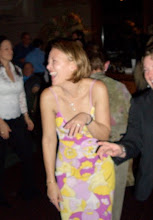I somehow missed the 2007 publication of The Yiddish Policemen's Union by Michael Chabon, despite an apparently splashy review on the front page of the Times' Arts section. I picked up the paperback recently knowing nothing about it, and found it to be even more interesting than his Pulitzer Prize-winning The Amazing Adventures of Kavalier & Clay.
The book is set in present day, but in an alternate reality. The divergence point is revealed to be the accidental death of Alaskan Congressman Anthony Dimond, who was responsible for preventing a vote to create a temporary refugee settlement for European Jews. In this alternate reality, Yiddish-speaking Jews took refuge in Sitka, Alaska, where they grew to a community 4 million strong.
The story is a murder mystery that resembles a Raymond Chandler novel more closely than it does Kavalier & Clay. The likable protagonist is cynical detective Meyer Landsman who's worked the Sitka homicide beat for years. He is called to the murder scene of a junkie who'd been living in the same fleabag motel as Meyer for some months. The room contains the dead guy, his heroin gear, and an oddly positioned game of chess. Meyer brings his partner and cousin Berko Shemetz, half-Jewish and half-Tlingit, into the case. Before they can learn much, they are told that Meyer's ex-wife Bina is back in town, and she's been promoted to commanding officer of their unit.
The book is not the comedy that the isolated press quotes on the cover make it out to be, but it is a fantastic read. Above all, the community of Sitka and its residents have been perfectly imagined by Chabon down to the most minute details. Beyond the geography and the towns, there are characters with deep backstories and complex relationship. From Meyer, Bina and Berko to the "boundary maven" Zimablist or the tiny Tlingit police chief Willie Dick, Chabon's Sitka has no shortage of interesting people.
Ultimately, the mystery takes Meyer into a world of Hasidic Jews that run an organized crime ring. Their mission is to rebuild the Temple in Jerusalem, which requires the birth of a red heifer and the destruction of the Palestinian Dome of the Rock (which will require massive amounts of explosives). If they succeed, the Messiah will come back to them, allowing for their return to their homelands.
The only criticism I can offer is that Chabon's use of similes was a little heavy, particularly early in the book. His departure from his usual style, with shorter sentences and paragraphs, worked very well. The book was meticulously researched, which the completely foreign setting demanded, and I'd highly recommend it. Note to future readers: there's a Yiddish glossary in the back. I didn't find it until I was about a hundred pages in. It helps.
Thursday, October 9, 2008
The Yiddish Policemen's Union
Labels:
literature
Subscribe to:
Post Comments (Atom)


No comments:
Post a Comment